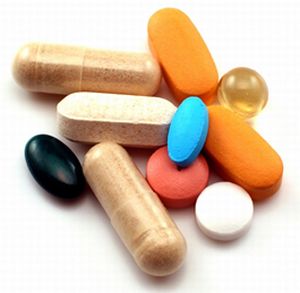Vitamins
 Vitamins are substances found in food that are essential to children’s normal growth and development and to all people’s lifelong health. There are 13 vitamins that your body needs. They are vitamins A, C, D, E, and K, and the vitamins known as the B complex: biotin, folate, niacin, pantothenic acid, riboflavin, thiamin, vitamin B6, and vitamin B12.
Vitamins are substances found in food that are essential to children’s normal growth and development and to all people’s lifelong health. There are 13 vitamins that your body needs. They are vitamins A, C, D, E, and K, and the vitamins known as the B complex: biotin, folate, niacin, pantothenic acid, riboflavin, thiamin, vitamin B6, and vitamin B12.
Each vitamin has specific jobs. Without enough of certain vitamins, you could develop a deficiency disease. For example, if you don’t take in enough vitamin D, you could develop rickets. Vitamin A prevents night blindness. Elderly people with low levels of vitamin B12 may be at greater risk of brain atrophy, or shrinkage of the brain.
You can usually obtain all the vitamins you need by eating a balanced diet that includes a variety of foods. However, you may need to take a multivitamin for optimal health. Unfortunately, you cannot skip nutritious foods and rely on vitamin supplements, because it’s impossible to get all the nutrition the body needs through supplements alone.
There are three main benefits to focusing on whole foods rather than dietary supplements. Food supplies you with optimal nutrition because whole foods provide a complex combination of nutrients, which supplements don’t offer. Many whole foods also contain dietary fiber, which can help prevent constipation, heart disease, and type 2 diabetes. And the right foods contain protective substances that are not available in supplements; for instance, phytochemicals, found in fruits and vegetables, protect you against cancer, and antioxidants combat cell and tissue damage.
It may be beneficial for you to take multivitamins if you eat fewer than 1,600 calories a day; if you are a woman who is pregnant, or breastfeeding; or if you have a medical condition that affects how your body absorbs nutrients, such as chronic diarrhea, food allergies, or food intolerance. People who eat a vegetarian diet may need to take a vitamin B12 supplement. For most people, a balanced diet based on the USDA MyPyramid provides all the vitamins the body needs.
Additional Facts
Vitamins D and K are the only vitamins your body can make. Otherwise, you can get vitamins only from the food or supplements you consume.
Unfortunately, with vitamins as with many other things, more is not always better: Too much of some vitamins can make you sick.
New USANA customers start with the USANA Vitamins Essentials to build a strong foundation of health. You also save when ordering the USANA Essentials for adults together in one pack!

